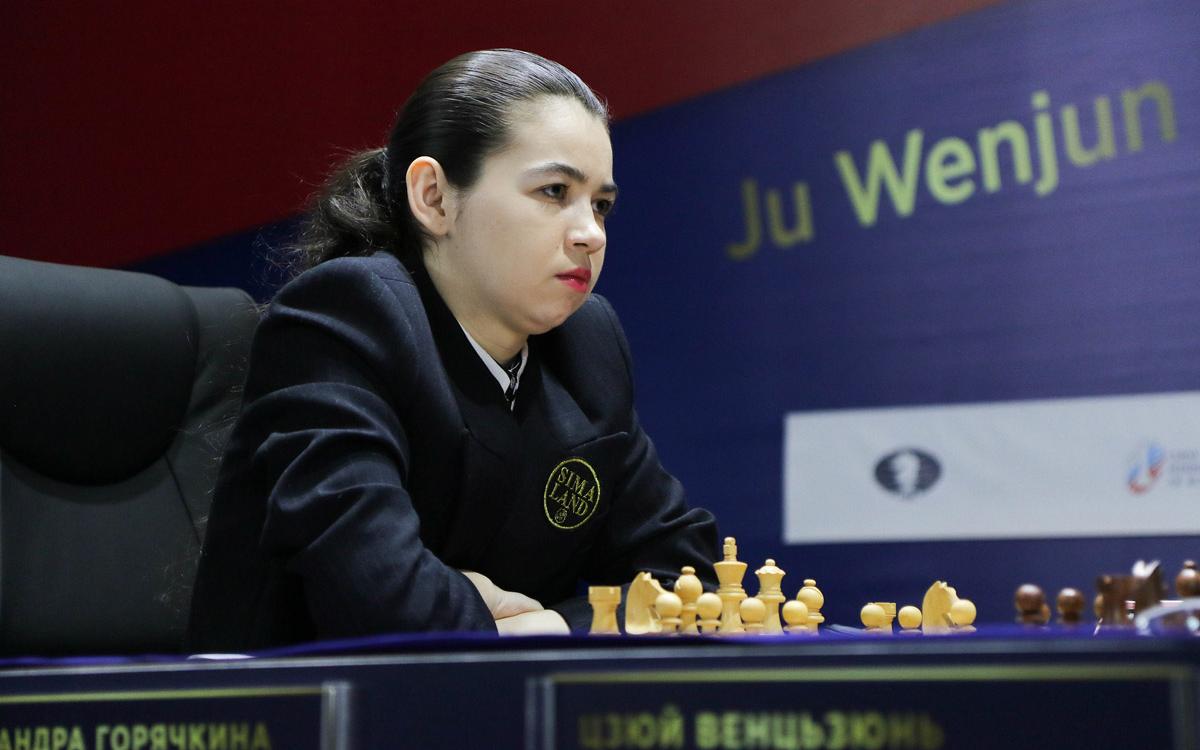
Goryachkina Wins Last Game To Force Playoff At FIDE Women's World Chess Championship
The 2020 women's world championship match will be decided in a playoff on Friday as the challenger Aleksandra Goryachkina (Russia) won on demand against the reigning world champion Ju Wenjun (China) in the last classical game.
The score is now tied with six points apiece. Both players were leading at some point and were close to match victory. In this highly competitive match, we saw six decisive games and six draws.
2020 Women's World Championship | Scores
| # | Fed | Name | Rtg | Perf | 1 | 2 | 3 | 4 | 5 | 6 | 7 | 8 | 9 | 10 | 11 | 12 | Score |
| 1 | Ju Wenjun | 2584 | 2578 | ½ | ½ | ½ | 1 | 0 | ½ | ½ | 0 | 1 | 1 | ½ | 0 | 6 | |
| 2 | Aleksandra Goryachkina | 2578 | 2584 | ½ | ½ | ½ | 0 | 1 | ½ | ½ | 1 | 0 | 0 | ½ | 1 | 6 |
After Ju's consecutive wins in game nine and 10, it seemed that the world champion would successfully defend her title. With just two games to go and time running out for the challenger, Goryachkina had another big problem. She was carrying the weight of the entire country of Russia, a glorious chess nation which hasn't had a world champion since Alexandra Kosteniuk reigned in the women's category (2008-2010) and Vladimir Kramnik (2000-2007) as the classical world champion.
The players drew game 11 quickly with both sides happy to draw. Goryachkina managed to win the final classical game to force a playoff.
Challenger Goryachkina has now made it as far as two of her compatriots who made it to the playoff stage for the highest title: Sergey Karjakin in 2016 and Kateryna Lagno in 2018. Both lost the rapid playoff. Can the 21-year-old player from Orsk break the rut and create history tomorrow?
Game 11 looked trivial, as a win for Ju (playing White) would simply end the match. Would Goryachkina throw the gauntlet and play all-out, over-stretch and lose?
Ju also had the choice of playing aggressively to score a hat-trick of wins in the match that would also give her a hat-trick of world championship titles. The players had plenty of time to figure out their strategies on the rest day after game 10.

Ju chose the safer approach by employing a calmer option than her previous white games in the Berlin variation of the Spanish. It was evident that neither side had any intent of playing for a win.
Ju was simply happy to get half a point and inch closer to overall match victory, while Goryachkina, playing Black, wanted to get on the scoreboard after blanks in the last two games. In fact, the challenger had not lost in consecutive games in nearly two years!

The result became clear around move 20. Both players had to play on to reach the obligatory 40-move rule set by FIDE. The players quickly traded almost all pieces to enter an opposite-colored bishop ending in just 25 moves. After another 15 moves of pushing wood, the players agreed to a draw on move 40. The game lasted just over an hour, by far the quickest game of the match.
Game 11 of the Women's World Championship Match ends in a draw after 40 moves.
— International Chess Federation (@FIDE_chess) January 22, 2020
Defending champion Ju Wenjun is leading 6-5. In the final game on Jan 23, the challenger Aleksandra Goryachkina has White in a must-win situation. https://t.co/06SR3zxdO6#WomenChessMatch #chess pic.twitter.com/OgY1WLBlF1
Game 12 was the last classical game of the match. Goryachkina had to win with White to keep the match alive and force a tiebreak. The challenger was the one pressing in all her white games and it was clear that Ju is seriously struggling with the black pieces in spite of winning game 10.
Winning the last game in a world championship to equalize has happened earlier in Kramnik-Leko (2004) and the infamous Kasparov-Karpov (1987) match. The last time it happened at a women's world championship final was in 1981, when Nana Alexandria beat Maia Chiburdanidze to equalize. Chiburdanidze retained her title per the rules back then.

Goryachkina started game 12 with the interesting Chigorin-Ponziani variation in the queen's pawn opening. The opening surprise clearly worked. Ju spent a huge chunk of her time and thought for her second move, 2...Nf6 for 20 minutes.
Goryachkina whipped out 3.Bf4 seconds later. This well-known idea has been the pet variation of creative GMs like Baadur Jobava, Richard Rapport and several others.
"The person that said winning isn’t everything, never won anything." - Mia Hamm
— International Chess Federation (@FIDE_chess) January 23, 2020
📷 by Misha Friedman #WomenChessMatch pic.twitter.com/s9dkdZnt2G
White's idea is simple: to develop pieces and get a reasonable position quickly. Black players can end up in serious problems if they don't know the theory and spend a lot of time in the opening. This is exactly what happened in the game.
Ju not only wasted a lot of time in the opening but also a lot of nervous energy. She had just 30 minutes left after move 19. The world champion had one hand on the trophy, but was visibly uncomfortable.
Goryachkina kept going. She played on both sides of the board and was also pushing in the center. She didn't go for any rash moves but was playing actively. She then sacrificed a pawn for a long-term initiative, which also ruined Ju's pawn structure.
The Chinese GM had the bishop pair but all her pieces were on the starting rank and passive. Her position was decent until she made a big inaccuracy with 30..e3, giving up her material advantage and also losing two pawns in the process.

The pressure got to the world champion and she was now down to a minute for the next four moves. Ju crumbled under the pressure of the match and the title and was simply lost by the time she made time-control. The challenger could have won much more quickly but she didn't spot the beautiful 41.d5! after receiving 30 additional minutes.
But the challenger's advantage was massive. She traded a pair of bishops, which weakened Black's king. Soon after, Goryachkina launched her h-pawn up the board and she was totally winning.
A dejected-looking world champion played on for a few moves but soon stretched out her hand in resignation on move 60 in a completely hopeless position.

Tiebreaks tomorrow will decide the #WomenChessMatch in Vladivostok as Aleksandra Goryachkina managed to tie the score to 6-6 in the last classical game against Ju Wenjun!
— ChesscomNews (@ChesscomNews) January 23, 2020
https://t.co/etSxht9tjN pic.twitter.com/aSWwvlLXZD
Tomorrow's playoff will have four rapid games with the time control of 25 minutes plus a 10-second increment from move one, and if necessary, up to five pairs of blitz games with the time control of five minutes plus three seconds from move one. If still tied, there will be one Armageddon game.
The prize fund is 500,000 euros. The winner will earn 60 percent of the prize fund, and 40 percent will go to the runner-up. If the match ends in a tie after 12 games and a tiebreak decides the match, the winner will receive 55 percent and the runner-up, 45 percent.
Watch our live coverage of game 12 with WFM Maria Emelianova and Joe Bruin below:
Previous reports:
- Ju Wenjun-Goryachkina Women's World Chess Championship Starts Sunday
- FIDE Women's World Chess Championship Starts With Draws
- Women's World Chess Championship: Ju Wenjun Strikes 1st
- FIDE Women's World Chess Championship: Goryachkina Wins As Match Moves To Russia
- FIDE Women's World Chess Championship: Goryachkina Strikes Again To Lead On Home Soil
- FIDE Women's World Chess Championship: Ju Wenjun Strikes Twice, Leads With 2 Games To Go


